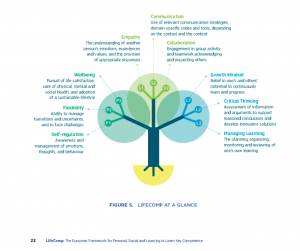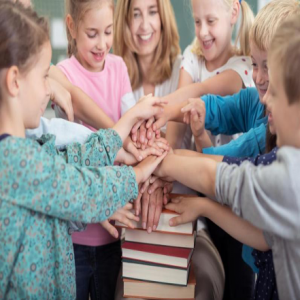In the DISK project the DigComp 2.0 framework from Joint Research Center (JRC) and the European Commission, is used, which identifies 5 key components of digital competence, which can be summarized as: 1) Information and data literacy, 2) Communication and collaboration, 3) Digital content creation, 4) Safety, and 5) Problem solving.
As another important, and timely framework has been launched by JRS, there might be some adaptations for the further development in the DISK project. The European Commission’s JRC launched 22 July 2020, the LifeComp, the European competence framework on Personal, Social and Learning to Learn.JRC has developed several competence frameworks, the „Comp“ family by #DigComp, #DigCompEdu, #DigCompOrg, #SELFIE,#Entrecomp, and now, #LifeComp.
In our rapidly changing societies, citizens need to develop competences which allow them to successfully manage the challenges posed by the many transitions taking place in their work, in their personal spheres, and in society (JRC, 2020).
The Joint Research Centre (JRC) developed the the LifeComp framework on behalf of, and in collaboration with the Directorate-General for Education, Youth, Sport, and Culture (DG EAC). This is the third competence framework for individuals the JRC has contributed to develop, following the already consolidated Digital Competence Framework for Citizens, also known as DigComp, and the Entrepreneurship Competence Framework, EntreComp. JRC believe that LifeComp is a crucial complement to these and other frameworks, and maybe even constitutes the base line, as it deals with life skills – the skills and competences that everybody should continually develop throughout life. The LifeComp framework is a conceptual reference framework; more work will be needed to put the framework into practice, and to guide stakeholders on its implementation.
The JRC report is part of their research on ‘Learning and Skills for the Digital Era’. Since 2005, more than 25 major studies have been undertaken in this area, resulting in more than 120 publications. More information on all of our studies can be found on the JRC Science hub
As according to the researchers LifeComp competences are teachable. They can be learned through formal or informal education.
„It is possible to teach a person to be a critical thinker, to control their emotions or to become more empathetic towards others. These skills are fundamental for people to be able to determine their own career paths and for their own well-being“
The researchers thus hope that the formalization of the skills into a framework will encourage schools and teachers to devote more time for them in the learning programmes.
The LifeComp framework is well aligned with the UNESCO initiative Futures of Education: Learning to become, which goes beyond the UNESCO SDGs and education for all, and targeting for education 2050. This initiatived rethinks how knowledge and learning can shape the future of humanity and the planet. The Futures of education initiative goes beyond the SDG and target for Education 2050. This initiative aims to rethink education and shape the future. The initiative catalyzes a global debate on how knowledge, education and learning must be rethought in a world of increasing complexity, uncertainty and precariousness.
Overview of the LifeComp framework
The LifeComp framework is a flexible tool that can be adapted to different learning settings, and target groups to support the development of the Personal, Social and Learning to Learn competences in a sociocultural context. Both formal, non-formal, and informal education can contribute to the acquisition of these competences.
As a rule, the definition of „competence“ includes knowledge, skills and attitudes. However, a holistic perspective that understands the interdependence between the elements of the framework as a complex ecosystem can be more effective. Indeed, the key competence comprises elements with different profiles and characteristics. For example, some focus on attitudes as dispositions and orientations for action; others represent a range of competences.
To cope with a given situation, individuals activate a range of competences that vary according to the requirements of the situation. All the competences included in the framework are therefore equally relevant, necessary, interrelated and interconnected and should be treated as parts of a whole.
Based on this framework, these are the nine skills, in three domains, that can help people in all ages to manage the challenges and changes in their personal and professional lives.
The Personal domain includes
-
Self-regulation: Awareness and management of emotions, thoughts and behaviour
-
Flexibility: Ability to manage transitions and uncertainty, and to face challenges
-
Wellbeing: Pursuit of life satisfaction, care of physical, mental and social health, and adoption of a sustainable lifestyle
The Social domain includes:
-
Empathy: The understanding of another person’s emotions, experiences and values, and the provision of appropriate responses
-
Communication: Use of relevant communication strategies, domain-specific codes and tools depending on the context and the content
-
Collaboration: Engagement in group activity and teamwork acknowledging and respecting others
The Learning to learn domain includes:
-
Growth mindset: Belief in one’s and others’ potential to continuously learn and progress
-
Critical thinking: Assessment of information and arguments to support reasoned conclusions and develop innovative solutions
-
Managing learning: The planning, organizing, monitoring and reviewing of one’s own learning
The LifeComp framework emphasizes the importance of social and personal skills. It aims to systemize the strengthening of these competences through education and lifelong learning.
The domains are as a visualized metaphor as in the Framework as a glance as in Figure 5.

Source: Sala, A., Punie, Y., Garkov, V. and Cabrera Giraldez, M., LifeComp: The European Framework for Personal, Social and Learning to Learn Key Competence, EUR 30246 EN, Publications Office of the European Union, Luxembourg, 2020, ISBN 978-92-76-19418-7 (online),978-92-76-19417-0 (print), doi:10.2760/302967 (online),10.2760/922681 (print), JRC120911
Below are the domains described somewhat more
The Personal domain
This domain relates to the personal development, prosperity and realization of the potential of each individual. The influential Delors (1996) stated that one of the four pillars of education against the background of lifelong learning was „learning to be“, which refers to the development of the personality and the ability to act with arrow autonomy, judgement and personal responsibility.
Personal development occurs in the relation and the interaction with others within the social and historical contexts. The influence of contextual factors
The Social domain
The social field refers to learning to live together and to the awareness of the social nature of human beings. It requires the ability and willingness to interact, communicate and cooperate constructively with others.
Being socially competent means cultivating an attitude of collaboration, respecting human diversity, overcoming prejudice, and compromising while participating in society.
The Learning to learn area
Learning how to learn is considered the „most important skill of all“. In our rapidly changing world, pupils entering primary school today are likely to work in jobs that do not yet exist, use technologies that have yet to be invented, or face unexpected global challenges.
The increasing flow of data brings with its new social phenomena, such as the deliberate transmission of dishonest information. Digitalization is changing the way people live, interact, study and work, and digital technologies can facilitate and enhance learning, while at the same time requiring the retraining and upgrading of today’s citizens. The complexity and interdependence of the challenges we face, and the unpredictability of the opportunities and threats they present, imply the need for citizens to become lifelong learners. Learning to learn is the ability to pursue and continue learning and to organize learning, including effective management of time and information, both individually and in groups. Learning to learn means taking responsibility for one’s own development.
This competence comprises several components in the personal and social sphere. In terms of personal development, learning to learn includes: inherited assets, such as talents; a cognitive dimension, such as problem-solving skills and the use of different learning methods; a metacognitive dimension, such as self-confidence and self-assessment of one’s own knowledge; an affective and motivational dimension, such as the motivation to learn and the regulation of emotions triggered by the learning activity; and learning dispositions, such as critical curiosity, a growth-oriented mindset, creativity and resilience. In social terms, Learning to Learn includes social, historical, economic and cultural aspects of the context in which learning takes place. The social dimension of learning to learn also emphasizes the relevance of the perception of support from significant others, the ability to learn with peers and in groups, and the environmental resources and social values within the community.
Learning to Learn is a competence that can be acquired throughout the lifespan. It is a relevant driver for change in adulthood, promoting employability and competitiveness
Ways forward
The existence of numerous socio-emotional education and learning frameworks from leading organizations worldwide shows the increasing importance attached to personal and social development through education and lifelong learning.
The differences in skills and characteristics identified in these frameworks are also a fact to be taken into account. The aim of the LifeComp conceptual framework is to create a common understanding and language at European level, following the 2018 Council Recommendation directive on key competences for lifelong learning, to support initiatives to ensure that these life skills are acquired as far as possible by all individuals in Europe through education, including non-formal and informal education, and through different levels of formal education from primary school to university.
Although the discussion on LifeComp learning outcomes and progress levels may be premature at this stage, the qualitative measurement of competence development through formative assessment and the creation of self-reflection tools to support all learners, including adults and informal learners, can be considered. As this is a theoretical framework that needs to be put into practice, piloting in schools with volunteer teachers can be envisaged to further develop and improve the framework. The framework, if adopted in the formal education sector, would benefit from mobilizing the active participation of the whole school community, including students, teachers, head teachers, families and local communities. This recommendation builds on the appropriateness of a whole-school approach and stresses the central importance of pupils‘ voices, as described in the UN Convention on the Rights of the Child, but also the relevance of the competences described for staff and community development.
Innovative pedagogical experiences with transversal and subject-based approaches are to be envisaged, so that we understand better how to teach LifeComp competences.
Abstract the LifeComp (From the report)
Personal, Social and Learning to Learn” was set as a key competence in 2018 by the Council Recommendation on Key Competences for Lifelong Learning. The LifeComp framework regards “Personal, Social and Learning to Learn” as a set of competences applying to all spheres of life that can be acquired through formal informal and non-formal education and can help citizens to thrive in the 21st Century. These competences have been established following a thorough literature research and several consultations with experts and stakeholders. LifeComp has nine competences with three descriptors each. The framework is conceptual and non-prescriptive. LifeComp can be used as a basis for the development of curricula and learning activities fostering personal, and social development, and learning to learn. The description of the competences can help in exploring its implementation and be contemplated as the embryo of a continuous discussion with teachers and educational policymakers.

